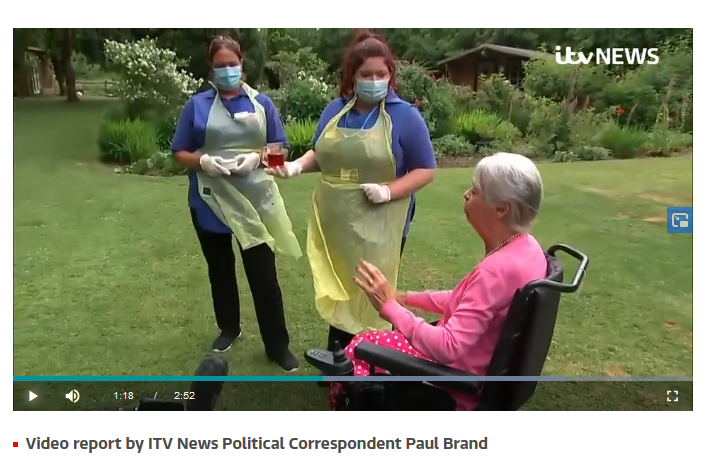Latest News from Everycare

More home care and a shift away from long-term support in care homes is recommended by the Association of Directors of Adult Social Services in England (ADASS).
A report by ADASS calls for a down-sizing of care homes with more care provided to people in their own homes.
ADASS president James Bullion stated in the report: ‘We have the opportunity to be radical, to be person-centred and to be transformative. We must seize this opportunity with both hands’.
‘Down-sizing’ care homes
The ADASS report stated: ‘For too long care has been built around organisations and buildings such as hospitals, day care centres and care homes.
‘The future must be about what works for us as individuals and our families, with a whole series of local organisations working together to organise care and support that enables us to work, stay independent at home, and be as engaged in our communities as we want.
‘More of this care is likely to be provided in our own homes and will be integrated into specialist housing and care packages akin to current extra care provision.
‘Any short-term support (particularly in the immediate post-Covid-19 period) for particular types of care provision should be tied to a commitment to participate in the reform conversation and where necessary to downsizing particular types of provision, such as potentially some forms of care home provision’.
‘Home First’
The report stated that ‘reform must be underpinned by the Home First principle’, with ‘a much stronger emphasis’ on some existing types of care and support which are housing based, such as ‘supported living’ and ‘extra care housing’, as well as new and innovative forms of care.
‘In turn, this may mean a shift away from existing types of residential care, for example, a lesser reliance on long stay, larger scale care homes although they may continue to play a key role in reablement and short-term care.’
“EVERYCARE IS MY EVERYTHING” …. a quote from a service user at our East Surrey branch when interviewed by ITV yesterday.
Whilst the quote wasn’t actually broadcast the client confirmed in the report how much she appreciated the Everycare support stating “Please don’t say they are never going to come”. It is heartening to know in such difficult times we are still here making a difference to the lives of so many.
 Gill worked really hard with her team and spent over three hours filming yesterday, so it was naturally a little disappointing that they showed so little of the piece. None the less there has already been positive feedback to the Everycare office this morning as people recognized the team.
Gill worked really hard with her team and spent over three hours filming yesterday, so it was naturally a little disappointing that they showed so little of the piece. None the less there has already been positive feedback to the Everycare office this morning as people recognized the team.
Gill said she didn’t want to be personally famous but she did want Everycare to be famous. Isn’t that just the unique team spirit of Everycare!
Little by little the service users that decided to cancel care because of the perceived risks of having contact with care staff are returning. The strain and pressure on relatives and friends is starting to show and some just can not cope any longer without help.
Although the risks of contracting Covid 19 in care homes has been much publicised the actual incidence of the illness in users of community care services has been extremely low.
We are very confident that all our service users can rely on our extreme diligence in taking every possible precaution when delivering any form of care and can be confident that our help is only a phone call away if we are needed.
From relaxing wheelchair walks around the stunning Cumbrian lakes to adrenalin-rushing abseiling and zip wiring, Calvert Trust – Outdoor Activity Centre, Keswick has everything designed specifically for the disabled
Set within the stunning Bassenthwaite Lake, overlooking the majestic Skiddaw mountain range the centre has over 3,500 people visiting each year and caters to people of all ages with sensory, learning or physical disabilities, including those with the most complex needs where other outdoor centres cannot supply.
‘The carers take part in all activities and we’ve even had people in their 80s come and enjoy themselves’
Justin Farnham, sales and marketing manager for the centre told homecare.co.uk: “We take disability groups from any age and any disability including learning, physical and sensory.
“We have a combination of school groups, charity groups and adult individuals who may come with a care home, on their own or with a friend or family member or carer. The carers take part in all of the activities and we’ve even had people in their 80s come and enjoy themselves.”
There are many activities at the centre with all groups enjoying a variety of single and multiple instructor-led activities. Each activity group has a dedicated instructor with them for the duration of their stay, allowing staff to get to know every individual. Mr Farnham said: “We have everything you’d expect, horse riding, abseiling, zip wire, canoeing, accessible cycling and high ropes.”
‘I’ve got a gentleman who is 73 years old and had never been on holiday’
Calvert Trust was created for disabled guests to enjoy the benefits of outdoor activities in a safe and accessible, yet challenging environment. “We can do it all,” says Mr Fanham. “Down by the jetty, if we have a wheelchair user, we have a hoist to get people in and out of canoes and we can put people in a hard-backed chair.
For more information visit the homecare.co.uk website
 Alzheimer’s Research UK and Dementia UK are calling on the government to prioritise dementia research, in the wake of a new report revealing the number of people with the condition in the UK and across Europe will double by 2050.
Alzheimer’s Research UK and Dementia UK are calling on the government to prioritise dementia research, in the wake of a new report revealing the number of people with the condition in the UK and across Europe will double by 2050.
According to the report, the number of people with dementia in the UK is set to rise to nearly two million by 2050, while in Europe the number is expected to rise to over 16 million.
Following the Conservatives’ 2019 election pledge to double dementia research funding, Alzheimer’s Research UK launched its Delivering the Dementia Moonshot report, outlining six priority areas for the UK government’s research funding.
These priorities are:
• To find ways to detect the diseases that cause dementia 10-15 years earlier and to broaden the search for new treatments.
• Intervene with those most at risk of developing dementia.
• Make the UK the best place to conduct clinical dementia research.
• Further our understanding of dementia risk reduction and prevention and dementia in the context of multimorbidities.
• Find ways to more effectively validate novel targets in early drug development to maximise chances of successful clinical trials
• Expand research infrastructure to maintain the UK’s position as a world leader in dementia research.
To read more visit the homecare.co.uk website




